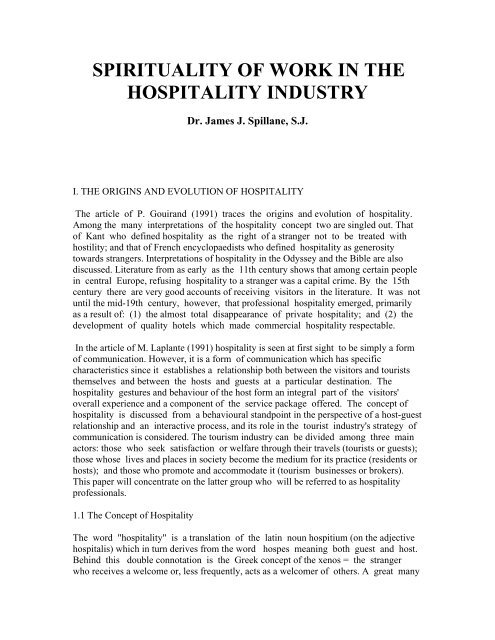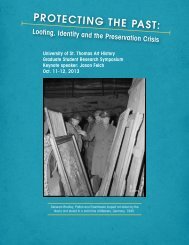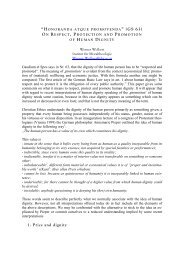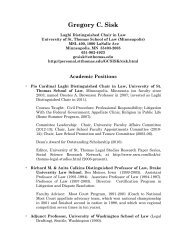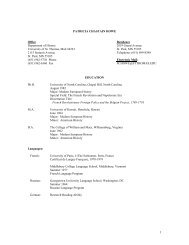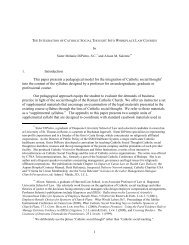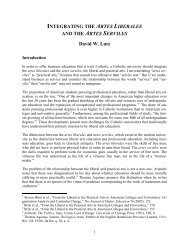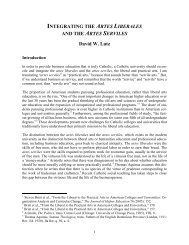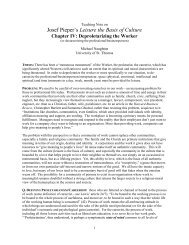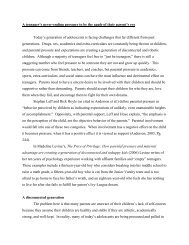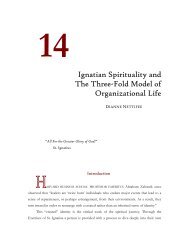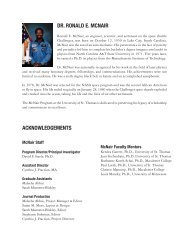Jim Spillane, SJ - University of St. Thomas
Jim Spillane, SJ - University of St. Thomas
Jim Spillane, SJ - University of St. Thomas
Create successful ePaper yourself
Turn your PDF publications into a flip-book with our unique Google optimized e-Paper software.
SPIRITUALITY OF WORK IN THE<br />
HOSPITALITY INDUSTRY<br />
Dr. James J. <strong>Spillane</strong>, S.J.<br />
I. THE ORIGINS AND EVOLUTION OF HOSPITALITY<br />
The article <strong>of</strong> P. Gouirand (1991) traces the origins and evolution <strong>of</strong> hospitality.<br />
Among the many interpretations <strong>of</strong> the hospitality concept two are singled out. That<br />
<strong>of</strong> Kant who defined hospitality as the right <strong>of</strong> a stranger not to be treated with<br />
hostility; and that <strong>of</strong> French encyclopaedists who defined hospitality as generosity<br />
towards strangers. Interpretations <strong>of</strong> hospitality in the Odyssey and the Bible are also<br />
discussed. Literature from as early as the 11th century shows that among certain people<br />
in central Europe, refusing hospitality to a stranger was a capital crime. By the 15th<br />
century there are very good accounts <strong>of</strong> receiving visitors in the literature. It was not<br />
until the mid-19th century, however, that pr<strong>of</strong>essional hospitality emerged, primarily<br />
as a result <strong>of</strong>: (1) the almost total disappearance <strong>of</strong> private hospitality; and (2) the<br />
development <strong>of</strong> quality hotels which made commercial hospitality respectable.<br />
In the article <strong>of</strong> M. Laplante (1991) hospitality is seen at first sight to be simply a form<br />
<strong>of</strong> communication. However, it is a form <strong>of</strong> communication which has specific<br />
characteristics since it establishes a relationship both between the visitors and tourists<br />
themselves and between the hosts and guests at a particular destination. The<br />
hospitality gestures and behaviour <strong>of</strong> the host form an integral part <strong>of</strong> the visitors'<br />
overall experience and a component <strong>of</strong> the service package <strong>of</strong>fered. The concept <strong>of</strong><br />
hospitality is discussed from a behavioural standpoint in the perspective <strong>of</strong> a host-guest<br />
relationship and an interactive process, and its role in the tourist industry's strategy <strong>of</strong><br />
communication is considered. The tourism industry can be divided among three main<br />
actors: those who seek satisfaction or welfare through their travels (tourists or guests);<br />
those whose lives and places in society become the medium for its practice (residents or<br />
hosts); and those who promote and accommodate it (tourism businesses or brokers).<br />
This paper will concentrate on the latter group who will be referred to as hospitality<br />
pr<strong>of</strong>essionals.<br />
1.1 The Concept <strong>of</strong> Hospitality<br />
The word "hospitality" is a translation <strong>of</strong> the latin noun hospitium (on the adjective<br />
hospitalis) which in turn derives from the word hospes meaning both guest and host.<br />
Behind this double connotation is the Greek concept <strong>of</strong> the xenos = the stranger<br />
who receives a welcome or, less frequently, acts as a welcomer <strong>of</strong> others. A great many
cultures attach religious and ethical value to the establishment <strong>of</strong> friendly exchanges<br />
between those who view one another as different - in rank, race or trade - and,<br />
therefore, potentially dangerous. In order to provide a focus for interpreting the diverse<br />
religious traditions that relate to this subject, J. Koenig (1987) concentrated upon the<br />
prescribed behavior for guests and hosts particularly at meals, and the reasons stated<br />
or implied for these moves.<br />
In all the culture and traditions examined about hospitality in especially in the form <strong>of</strong><br />
the guest meal, J. Koenig (1987) found them marked by exchanges <strong>of</strong> spiritual and /<br />
or material goods. These exchanges frequently have the effect <strong>of</strong> multiplying<br />
blessings and merit for the participants beyond the sum total <strong>of</strong> resources brought by<br />
the guests and hosts. Sometimes gods, dead relatives and forces <strong>of</strong> nature are thought to<br />
be present at the meal. In every case, their influence is felt, typically as a communion<br />
or production alliance with the deeper forces <strong>of</strong> the universe.<br />
In classical Greek and Latin literature, hospitality is an eminently practical virtue.<br />
Through gift exchanges and the sharing <strong>of</strong> food or shelter peace and harmony are<br />
achieved in what would otherwise be a chaotic world. In the Greek epic tradition, the<br />
gods themselves sometimes put on human disguises and assume the role <strong>of</strong> guests. On<br />
these occasions when they are welcomed, they respond with good news (Odyssey<br />
1:180 ff) or extraordinary gifts (Ovid Metamorphoses 8:678 ff).<br />
For the ancient Greeks and Romans hospitality was a sure sign <strong>of</strong> civilization and<br />
religion in practice. From the Homeric period onwards the Greek world considered that<br />
only "barbarians" were inhospitable. The welcome <strong>of</strong> the stranger was not to be<br />
restricted to material succour but had perforce to respect his humanity. In the ancient<br />
and modern culture <strong>of</strong> nomadic peoples, too, hospitality means a vital necessity<br />
which has become a virtue. J. Danielou said that civilization took a decisive step,<br />
perhaps the decisive step, the day when the stranger stopped being an enemy and became<br />
a guest; the day, that is, when the human community was created.<br />
II. A BIBLICAL THEOLOGY OF PLEASURE<br />
Many people today are concerned about the apparent incompatability <strong>of</strong><br />
religion and modern forms <strong>of</strong> tourism which seems to be based on hedonism. If<br />
Christians are concerned with the God <strong>of</strong> everyday living, then God is in fact as<br />
present in the pleasures and playfulness <strong>of</strong> human life as He is in pain. To do so, they<br />
need to return to the sources <strong>of</strong> their faith. They need to reinterpret and reassess the<br />
past interpretations which have been handed down to them from their Judeo-Christian<br />
heritage. A first immediate impression is that the biblical text has nothing immediate to<br />
say to their modern dilemma <strong>of</strong> reconciling religion and pleasure.<br />
However, there are two primary or preliminary points which emerge from a study <strong>of</strong> the<br />
Bible in relation to the pleasures <strong>of</strong> everyday life. Firstly, in a general way, eating,<br />
drinking and sexuality are implicitly part <strong>of</strong> the structure <strong>of</strong> creation. Food and drink<br />
are fundamental to creation and an essential part or aspect <strong>of</strong> God's creativity and the
giftedness <strong>of</strong> the world (Psalm 145:15-16). Even wine, though a product <strong>of</strong> human<br />
cultivation, is regarded as a gift <strong>of</strong> God and part <strong>of</strong> the natural celebration <strong>of</strong> life which<br />
God's creation calls forth (Psalm 104: 14-15 and Eccl. 10:19) In this sense, both eating<br />
and drinking are linked with hospitality. They signify far more than the satiating <strong>of</strong><br />
bodily needs. They stand for community and intimacy, the interlocking <strong>of</strong> one human<br />
life with another in the bonds <strong>of</strong> family and friendship.<br />
In the same way, sexuality is linked not just to procreation and the responsibilities<br />
<strong>of</strong> marriage but also to the joys <strong>of</strong> intimacy, bodily passion and self transcendence.<br />
Although God transcends the boundaries <strong>of</strong> gender, nevertheless, sexual<br />
differentiation is an important indication <strong>of</strong> human likeness to the divine (Genesis<br />
1:26-27). Like its divine counterpart, human life is creative and relational. In this<br />
view, the pleasures <strong>of</strong> everyday life are revelatory <strong>of</strong> the divine image. They reflect<br />
the divine energy for life, community and intimacy around which human life is<br />
created and sustained. In this sense, pleasure is implicitly God bearing and God<br />
revealing.<br />
Secondly, human pleasure in regard to eating, drinking and sexuality is not only part<br />
<strong>of</strong> creation but also part <strong>of</strong> the symbolic structure <strong>of</strong> redemption. The symbolism <strong>of</strong><br />
the sacred meal points eschatologically to the final fulfilment <strong>of</strong> God's creation in<br />
the reaffirmation <strong>of</strong> covenant and community. (Mark 14:25 and I Cor. 11:26)<br />
The riches <strong>of</strong> hope and its partial realization within human experience is expressed in the<br />
Bible again and again through the images <strong>of</strong> eating and drinking - images <strong>of</strong><br />
extravagance and sumptuousness which reveal the generosity <strong>of</strong> God's<br />
salvation.[Deut.16:11-12,14-15;Amos 9:13-15; Ezek.47:6-12 ; Joel 3:18; Luke 15:22-24;<br />
John 2:1-11; Acts 14:17-18;II Cor. 9:10].<br />
The Old Testament imagery associated with the Exodus, wilderness, and promised land<br />
is also part <strong>of</strong> the same symbolism [Exod. 3:7-8; Exod.16; Neh. 9:14; Psalm 78:9;<br />
Psalm 23:5; Deut. 8:7-10]. Food and drink ["a land flowing with milk and honey" in<br />
Exod. 3:8] express the divine consolations for a people once enslaved and oppressed<br />
and now freed. The symbolism reflects the Hebrew view that by enjoying the<br />
pleasures <strong>of</strong> eating and drinking, one is entering into the full humanity in<br />
community which is the purpose <strong>of</strong> human life and God's salvation. Here eating and<br />
drinking are closely bound up with notions <strong>of</strong> covenant. Precisely within these<br />
convenantal activities Isreal as the people <strong>of</strong> God acknowledges its joyful dependence <strong>of</strong><br />
God's beauty, given in creation and renewed in salvation. The renewal <strong>of</strong> this<br />
covenant relationship with God implies the acknowledgment by God's chosen people<br />
through festival and the pleasures <strong>of</strong> daily life that "the earth is the Lord's and its<br />
fullness" [Psalm 24:1 and I Cor.10:26].<br />
The pleasure <strong>of</strong> eating, drinking and sexuality are appropriate images for redemption in<br />
both the Old Testament and the New Testament because they belong to the foundational<br />
structure <strong>of</strong> creation and have the potential to be God revealing. Moreover, the Bible also<br />
contains a basic affirmation <strong>of</strong> the body and bodily existence and avoids dualistic
modes <strong>of</strong> thinking which denigrates the body in favor <strong>of</strong> the soul. The body is the locus<br />
<strong>of</strong> revelation and therefore an essential part <strong>of</strong> God's salvation. In no sense, therefore,<br />
can we derive a negative attitude to the body in the Bible. We cannot hold a<br />
perspective which sees the pleasures <strong>of</strong> the body as irrelevant or evil. Not only is the<br />
body affirmed in relation to God, eating, drinking and sexuality are also understood as<br />
<strong>of</strong> value in themselves, with the capacity to symbolize God's salvation.<br />
All this has important implications for the way we live our lives as Christians. A<br />
genuine theology <strong>of</strong> pleasure takes seriously the creative power <strong>of</strong> play and is based<br />
on the world as the sphere <strong>of</strong> God's creative and redemptive activity. This means a<br />
rediscovery <strong>of</strong> God's gift in creation. It also means a challenge to our ethical<br />
neurosis: the assumption that we honor God's gifts when, and only when, we do not<br />
abuse them by overuse. God's gifts are equally "abused" through neglect and fear. A<br />
theology <strong>of</strong> pleasure challenges forms <strong>of</strong> spirituality which identify God only in<br />
suffering and painful human experience. We need to develop a spirituality which sees<br />
play and pleasure as equally God revealing. In the pleasure <strong>of</strong> eating and drinking, in<br />
the joy <strong>of</strong> sexual passion, we need to discover the God who is joyful and extravagant,<br />
the God <strong>of</strong> play and passion, the God <strong>of</strong> love and celebration. Our caution and timidity as<br />
much as our moralism and hyprocracy need to be challenged by such a spirituality.<br />
III. THE SPECIAL NATURE OF WORK IN THE HOSPITALITY INDUSTRY<br />
The growth <strong>of</strong> services is nothing new. As early as 1900 America and Britain both<br />
had more jobs in services than in industry. By 1950 services employed half <strong>of</strong> all<br />
American workers. America has the biggest service sector, accounting for 72% <strong>of</strong> its<br />
GDP (The Economist 20 February, 1993, 63). Services are the fastest growing part <strong>of</strong><br />
international trade, accounting for 20% <strong>of</strong> total world trade and 30% <strong>of</strong> American<br />
exports. Tourism is one <strong>of</strong> these services. One in every 16 workers world-wide already<br />
owes his or her job to tourism, according to a report by the US-based Wharton<br />
Econometric Forecasting Associates. According to the report, travel and tourism is the<br />
largest industry in the world in terms <strong>of</strong> employment.<br />
Work in the service sector is quite different from that in agriculture or<br />
manufacturing. A service has been described as a "deed, act, or performance" (Berry,<br />
1980, 24). Two functional issues are: at whom (or what) is the act directed, and is this<br />
act tangible or intangible in nature? These two questions result in a four-way<br />
classification scheme involving (1) tangible actions to people's bodies, such as airline<br />
transportation, haircutting and surgery; (2) tangible actions to goods and other physical<br />
possessions, such as air freight, lawn mowing and janitorial services; (3) tangible<br />
actions directed at people's minds, such as broadcasting and education; and (4)<br />
intangible actions directed at people's intangible assets, such as insurance, investment<br />
banking and consulting. (Lovelock, 1998,47)<br />
This categorization scheme is useful in helping to answer the following questions<br />
related to the analysis and marketing <strong>of</strong> services. Does the customer need to be<br />
physically present: throughout service delivery? only to initiate or terminate the service
transaction? or not at all? Does the customer need to be mentally present during the<br />
service delivery? Can mental presence be maintained across physical distances through<br />
mail or electronic communications? In what ways is the target <strong>of</strong> the service act<br />
"modified" by the receipt <strong>of</strong> the service? And how does the customer benefit from<br />
these "modifications"?<br />
Especially in the tourism sector where services are created as they are consumed and<br />
the customer is <strong>of</strong>ten actually involved in the production process, there is broad scope for<br />
tailoring the service to meet the needs <strong>of</strong> individual customers. Customization can<br />
proceed along at least two dimensions. The first concerns the extent to which the<br />
characteristics <strong>of</strong> the service and its delivery system lend themselves to<br />
customization. The second relates to how much judgment customer contact personnel are<br />
able to exercise in defining the nature <strong>of</strong> the service received by individual customers.<br />
Some service concepts are quite standardized while other services <strong>of</strong>fer customers a<br />
wide choice <strong>of</strong> options.<br />
There is a class <strong>of</strong> services that not only involves a high degree <strong>of</strong> customization but<br />
also requires customer contact personnel to exercise judgment concerning the<br />
characteristics <strong>of</strong> the service and how it is delivered to each customer. This type <strong>of</strong><br />
service is called prescriptive and the focus <strong>of</strong> control shifts from the user to the<br />
supplier. Pr<strong>of</strong>essional services such as law, medicine, accounting, architecture and tour<br />
guiding fall within this category. They are all white collar "knowledge industries,"<br />
requiring extensive training to develop the requisite skills and judgment needed for<br />
satisfactory service delivery. As a result <strong>of</strong> this fact, much <strong>of</strong> the literature on the service<br />
industry refers to this encounter between the customer and the service contract personnel<br />
as "the moment <strong>of</strong> truth" because it in fact determines the level <strong>of</strong> customer satisfaction.<br />
IV. THE SPIRITUAL DIMENSION OF HOSPITALITY<br />
Showing effective kindness toward the stranger has its ultimate foundation in the<br />
simple fact that we all belong to the one human race. The bond thus created was a<br />
natural expression in societies which were struggling for survival at a purely<br />
subsistence level or only precariously (food, lodging, security) for simple survival. The<br />
host made an investment for a better future where he could, if needs be, find the same<br />
welcoming reception either from the present guest or from the society as a whole to<br />
whose system <strong>of</strong> hospitality he was obliged. In this situation, hospitality was<br />
grounded in the basic needs <strong>of</strong> survival and those needs could be answered only in<br />
dependency on others.<br />
Today beneath the layers <strong>of</strong> cultural deposit in any modern society there are cultural<br />
interactions in the hospitality industry which can be the channels <strong>of</strong> God's giftedness<br />
to creation, His presence, sacraments <strong>of</strong> the vivifying Spirit <strong>of</strong> God <strong>of</strong> Life. In the<br />
early Church, there were countless sacraments and no doubt hospitality was one <strong>of</strong> them.<br />
Already in the Old Testament hospitality took on this spiritual dimension: "Show care<br />
and concern for the stranger just as God shows for you". The Cosmos is the house <strong>of</strong><br />
God; all are guests in it [Mt. 5:45]. We are all on an exodus through the same desert,
washed and refreshed by the same Spirit, depending on each other for true existence<br />
and where the stranger is simply a friend in the making. In that Old Testament desert<br />
situation, should host and guest be enemies, the practice <strong>of</strong> Old Testament<br />
hospitality then involved reconciliation: there was a oneness, an atonement. Today,<br />
Christians worthy <strong>of</strong> the name are messengers <strong>of</strong> that same at-one-ment. Moreover, in<br />
the Old Testament times the guest was sacred and the host had to put himself out for<br />
him or her, even to endangering the lives <strong>of</strong> his own family. Christianity by no means<br />
abrograted this aspect <strong>of</strong> hospitality.<br />
In chapter 18 <strong>of</strong> the Book <strong>of</strong> Genesis Abraham was rewarded by God in an unforseen<br />
and deserving manner with the annunciation <strong>of</strong> the miraculous birth <strong>of</strong> a child who<br />
would inherit the divine promises which God made to the patriarch and which would<br />
inaugurate the history <strong>of</strong> the salvation <strong>of</strong> the world. Other Old Testament texts confirm<br />
the practice <strong>of</strong> hospitality and the Law <strong>of</strong> Moses turns it into a commandment<br />
with a precise justification: Isreal must be generous towards the stranger because the<br />
people <strong>of</strong> God had also been a stranger in the land <strong>of</strong> Egypt where the inhospitality <strong>of</strong><br />
Pharaoh had been severely punished and in imitation <strong>of</strong> her God who "loves the<br />
sojourner, giving him food and clothing" (Deut. 10:18-19 cf. Exod. 22:20 and Lev.<br />
19:34).<br />
One <strong>of</strong> the famous characters in the Bible, Job, in claiming to be the unjust victim <strong>of</strong><br />
misfortune, urges among other things his irreproachable hospitality as a pro<strong>of</strong> <strong>of</strong> his<br />
integrity. The pious Tobit, likewise, reserved a tenth <strong>of</strong> his produce for the benefit <strong>of</strong><br />
strangers (Tobit 1:8). Even if the theme is not explicitly utilized to recommend the virtues<br />
<strong>of</strong> hospitality, God himself is presented in the Bible as the perfect host <strong>of</strong> those who<br />
seek refuge in his tent, his "house", his temple. For Moslems, too, the pilgrim to<br />
Mecca is the "guest <strong>of</strong> God".<br />
4.1 Hospitality in the Ministry <strong>of</strong> Jesus<br />
When after 30 years <strong>of</strong> silent life concealed in Nazareth, Jesus began his public<br />
ministry, he chose to live in a condition <strong>of</strong> having to rely on other people's aid and<br />
hospitality [Mt. 27:55 and Mark 15:40-41] Mary felt honored to <strong>of</strong>fer him<br />
hospitality. Jesus also experienced the condition <strong>of</strong> being an unwelcome guest [ Luke<br />
2:7 in Bethlehem] and on his lost pilgrimage to Jerusalem by a village <strong>of</strong> Samaritans [<br />
Luke 9:52-56]. At Capernaum Jesus was a habitual guest in the house <strong>of</strong> the brothers<br />
Peter and Andrew his Apostles. The Gospel <strong>of</strong> Luke [Luke 10:38-42] has preserved for<br />
use the delightful gospel "interior" in the episode <strong>of</strong> Martha and Mary. A large part<br />
<strong>of</strong> the Gospel message is in fact placed in the context <strong>of</strong> the practice <strong>of</strong> hospitality<br />
from the marriage feast <strong>of</strong> Cana to the last Passover. Hospitality is <strong>of</strong>fered to Christ by<br />
friends and benefactors. In the majestic vision <strong>of</strong> the Last Judgement [Matthew Chap.<br />
25] Jesus says that man's eternal destiny depends, too, on the real charity he has<br />
bestowed on those in need, including the stranger. The teaching <strong>of</strong> Christ attaches<br />
great importance, in particular, to the hospitality given to gospel workers [John 13:19 ,<br />
Mt. 10:40-42 and Mt. 10:9-15].
A first reading <strong>of</strong> the gospels would seem to indicate that Jesus in his ministry was<br />
noted mainly for his miracles. Others, however, suggest that that which marked Jesus<br />
<strong>of</strong>f from other Jewish teachers <strong>of</strong> his time was precisely his attitude toward meals or<br />
his "table ministry". Jesus deliberately shared his table with all sorts <strong>of</strong> people; no<br />
one was excluded. He seems to have intentionally disregarded fasting and this is a<br />
prophetic act, for theological reasons. Through his attitudes toward meals, he was<br />
telling us something about God and His Kingdom and what it means to belong to it.<br />
Jesus was a wandering charismatic messenger <strong>of</strong> the Good News. As such, he had no<br />
home and was therefore frequently a guest. In Luke 7:36 there is a dinner at the house<br />
<strong>of</strong> Simon the Pharisee. [Also Mark 2:15 ff ; Mark 14:3 ff.] He lodged with his friends<br />
Lazarus, Martha and Mary [Luke 10:38 ff] and even spent the day with Zacheus, the<br />
tax collector [Luke 19:5 ff] and tax collectors were always mentioned in the same<br />
breath with sinners. He seems to have <strong>of</strong>ten been associated with marginal cases. No<br />
doubt the early Church has somehow idealized these stories about Jesus and they<br />
obviously reflect the actual practice <strong>of</strong> that Church itself. Yet the earliest strata <strong>of</strong> the<br />
New Testament text indicate quite firmly that Jesus did truly associate with such<br />
people. Not only did he associate with them and share their food but he also became<br />
their friend. Jesus proclaimed that the Kingdom is truly present; it is the gift <strong>of</strong><br />
God's abundance for everyone. No one is excluded; all are invited to the fullness <strong>of</strong><br />
community life, to the banquet and this abundance is encountered in the ministry <strong>of</strong><br />
Jesus.<br />
Why did Jesus deliberately choose this prophetic act <strong>of</strong> feasting to proclaim the<br />
Kingdom and not some other more "respectable" way which would be acceptable to<br />
the people <strong>of</strong> his time? Jesus was deliberately counteracting the common Jewish<br />
religious practice <strong>of</strong> fasting. This practice was closely connected to the prayer life <strong>of</strong> the<br />
Jews. It was almost considered to be a way <strong>of</strong> convincing God to be merciful, this God<br />
who had retreated to his heavenly sanctuary to the extent that he was practically beyond<br />
hearing. Hence, fasting was a plea for God to return once more to his people. Then Jesus<br />
appears on the scene and steps all over this hallowed practice <strong>of</strong> fasting by<br />
proclaiming a feast, the kingdom banquet. In this way he shouted from the ro<strong>of</strong>tops<br />
that God had returned to his people, to all <strong>of</strong> his people, just and sinner alike. In fact,<br />
the party was especially for the outcast, for the compassion <strong>of</strong> God is boundless; his<br />
reckless mad love goes beyond human standards and requirements. Thus we can see<br />
that work in the hospitality industry rather than being contrary to our Christian beliefs<br />
does in fact have the potential for continuing God's work on earth.<br />
In conclusion, Christian hospitality, though placed in a wider historical, social and<br />
religious context we have briefly mentioned, has therefore a new motivation, spurred by<br />
the good news <strong>of</strong> Christ. It may be said that the practice <strong>of</strong> hospitality becomes a key<br />
means <strong>of</strong> evangelization. This explains why love for the stranger and hospitality<br />
are considered as the most "<strong>of</strong>ficial" manifestation <strong>of</strong> the charity enjoined by Christ and<br />
<strong>of</strong> which he himself gave a conclusive example. The history <strong>of</strong> the first evangelization is<br />
full <strong>of</strong> teachings and examples [ Mt. 18:24-28 ; I Cor. 1:12 ; I Cor. 3:4-6 ; I Cor. 3:21-<br />
22 and Titus 3:13] In the course <strong>of</strong> time, the conditions <strong>of</strong> society and real situations
can change, but the substance <strong>of</strong> Christian sentiment and duty cannot change; charity<br />
cannot grow cold or be extinguished because it is that love which Christ revealed to<br />
the world and which makes Christians the "salt <strong>of</strong> the earth' and the "light <strong>of</strong> the<br />
world" [Mt. 5:13-14] in the ebb and flow <strong>of</strong> an ever mobile humanity.<br />
V. DIMENSIONS OF A CHRISTIAN SPIRITUALITY OF WORK FOR<br />
HOSPITALITY PROFESSIONALS<br />
To develop models <strong>of</strong> spirituality it is necessary to select criteria for<br />
differentiation. This selection is always arbitrary, however. It establishes the<br />
parameters by which the models are distinguished. Here the criteria will be<br />
"attitudes" toward two potential loci for expressions: the world (including human<br />
history and institutions) and history (especially change and conversion). We can<br />
determine the models by the following question. Does a spirituality view the world<br />
and/or history as a positive locus for expressions <strong>of</strong> the authentic? If a spirituality is<br />
negative toward both we call it apophatic; if it is positive toward both, we call it<br />
apostolic; if it is positive toward the world but not toward history, we call it city-<strong>of</strong>-God;<br />
and if its is positive toward history but not toward the world we call it prophetic. One<br />
must not adhere to these models too rigorously. They are examples to illustrate the<br />
tendencies <strong>of</strong> their respective models to a marked degree; but most spiritualities are<br />
mixtures <strong>of</strong> all four, with perhaps one or more predominating. A genuine<br />
spirituality <strong>of</strong> work for hospitality pr<strong>of</strong>essionals must clearly be apostolic.<br />
5.1 A Sense <strong>of</strong> Vocation and Mission<br />
What all Christians hope to do in their spiritual lifes is to continue the mission <strong>of</strong><br />
Jesus. Throughout the history <strong>of</strong> Christianity, that mission has appropriated a multitude<br />
<strong>of</strong> expressions involving a wide spectrum <strong>of</strong> activities and ministries. A ministry or<br />
pr<strong>of</strong>ession is a specific activity or what we do. Mission provides meaning and direction<br />
to that activity. For our activity to be truly Christian, it must reflect in some way the life<br />
and work <strong>of</strong> Jesus <strong>of</strong> Nazareth. Hospitality pr<strong>of</strong>essionals continue the mission <strong>of</strong> Jesus,<br />
in particular their mission <strong>of</strong> loving service to those in need, a central work <strong>of</strong> Jesus.<br />
In Christian life, pr<strong>of</strong>essional work or ministry is <strong>of</strong>ten spoken <strong>of</strong> as continuing the<br />
mission <strong>of</strong> Jesus the teacher, preacher, servant, prophet, shepherd, priest and<br />
peacemaker. Hospitality pr<strong>of</strong>essionals also perform many <strong>of</strong> these services.<br />
There are many qualities <strong>of</strong> life rooted in the example <strong>of</strong> Jesus and three basic qualities<br />
are reflective <strong>of</strong> Jesus' life <strong>of</strong> hospitable service to others: responsiveness, competence<br />
and respect. Underlying Jesus' desire to serve those in need were sensitivity,<br />
adaptability and willingness that are today basic building blocks for an apostolic<br />
spirituality <strong>of</strong> hospitality. Sensitivity to the situation at hand is essential if a hospitality<br />
pr<strong>of</strong>essional's response is to be effective. Adaptability to the situation as it changes is also<br />
essential if their response is to be appropriate. Willingness to be involved is essential if<br />
their response is to be consistent. Ultimately, the driving force behind this<br />
responsiveness is compassion which is not the same as pity. The true core <strong>of</strong><br />
compassion is the urgency to act. Compasssion never merely observes; it initiates and
interacts. In Jesus' work, compassion is second only to love. When personal benefit<br />
becomes the primary goal <strong>of</strong> service in the hospitality industry then this<br />
compassion gives way to conceit.<br />
Competence shapes the overall effectiveness <strong>of</strong> our response. However sensitive,<br />
adaptable and willing that response may be, its lasting effect must reflect competence.<br />
Service industries require a competence that is quite different from that in<br />
agricultural or manufacturing work. Two realities that touch competence are involved<br />
in the hospitality industry: material variables and personal variables. Material<br />
variable differ among the various aspects <strong>of</strong> the hospitality industry but they generally<br />
include some common elements. Firstly, there is a body <strong>of</strong> living knowledge in so<br />
far as new information replaces old on a regular basis. We use the work "living" in the<br />
sense <strong>of</strong> growing and at least changing. Secondly, there are natural or acquired skills<br />
which enable hospitality pr<strong>of</strong>essionals to use that knowledge. Thirdly, there are the<br />
willingness, capacity and commitment to acquire new and refined skills to match<br />
developments within the field <strong>of</strong> knowledge now called hospitality, leisure or<br />
tourism studies. Finally, there are necessary resources <strong>of</strong> whatever kind which make it<br />
possible for hospitality pr<strong>of</strong>essionals to use skills with knowledge. This is the variable<br />
over which they very <strong>of</strong>ten have the least control. The amount <strong>of</strong> time and energy it<br />
takes to develop and maintain competence is directly proportional to the amount <strong>of</strong><br />
change within these material variables. In the hospitality pr<strong>of</strong>essions those<br />
variables change regularly, if not continously. Thus, maintaining competence in<br />
terms <strong>of</strong> the material variables demands a great deal <strong>of</strong> time and energy.<br />
A hospitality pr<strong>of</strong>essional's sense <strong>of</strong> competence is also affected by personal variables.<br />
These variables include the personalities, preferences and predicaments <strong>of</strong> those whom<br />
they serve. Unfortunately, material variables <strong>of</strong>ten become ineffective when personal<br />
variables resist modification. While personal variables do not render a hospitality<br />
pr<strong>of</strong>essional incompetent, they can create that feeling and give that perspective. The<br />
driving force <strong>of</strong> competence is justice rooted in human dignity. Whatever compromises<br />
human dignity is an injustice. There is also the justice <strong>of</strong> preparation. This means the<br />
informed readiness <strong>of</strong> the hospitality pr<strong>of</strong>essional. They must know what they can and<br />
cannot do. They must not compromise the welfare <strong>of</strong> others by attempting anything they<br />
know little or nothing about. Respect is characterized by a hospitality pr<strong>of</strong>essional's<br />
recognition <strong>of</strong> each person's uniqueness. It is their affirmation <strong>of</strong> the dignity <strong>of</strong> each<br />
person, a dignity based in their creation as God's image and likeness as well as their<br />
efforts to listen, communicate and interact through ways and means consistent with that<br />
uniqueness and dignity. Work in the hospitality industry brings them to encounters and<br />
interactions with people. Respect reminds them that regardless <strong>of</strong> what they have to do in<br />
the work <strong>of</strong> hospitality, the value <strong>of</strong> a human being can never be compromised. The<br />
driving force <strong>of</strong> respect is love. Since according to Christianity God is an incarnational<br />
God, their ways and means <strong>of</strong> dealing with others are primary components for their<br />
transformation into the likeness <strong>of</strong> Jesus and, ultimately, for their salvation.<br />
5.2 A Sense <strong>of</strong> Community with Fellow Hospitality Pr<strong>of</strong>essionals
Hospitality pr<strong>of</strong>essionals do not in fact continue their work <strong>of</strong> Christian hospitality<br />
alone. They need and should draw on the support <strong>of</strong> others, just as others need and draw<br />
on their support. The primary components will thus be their continuing relationship<br />
with the Lord and their friends. This is especially important during times <strong>of</strong> feeling<br />
alienated from their working group in a large, impersonal institution <strong>of</strong> hospitality<br />
such as a hotel, restaurant or travel agency. There is no magic formula and no generic<br />
solution here. There is always the possibility that some fellow workers will feel<br />
threatened by and envious <strong>of</strong> the excellence <strong>of</strong> their colleagues. In some sense they<br />
cannot take responsibility for others' feelings and attitudes. They should be happy with<br />
what they are and do. A measure <strong>of</strong> self acceptance is needed. Awareness <strong>of</strong> and<br />
fidelity to their responsibilities is a healthier approach and safeguard against<br />
reactions and judgments based on misunderstanding, jealousy, mistrust, lack <strong>of</strong><br />
information and poor communication.<br />
Christian pr<strong>of</strong>essions in the hospitality industry also needs to be in vertical relationship<br />
with the Lord. Work, prayer and relations with their fellow employees draw time and<br />
energy from the same pool. Thus it is not uncommon for hospitality pr<strong>of</strong>ession to have<br />
difficulty putting adequate levels <strong>of</strong> desire and effort into their prayer and spiritual life.<br />
There are four very practical means for developing and maintaining a relationship with<br />
the Lord in the midst <strong>of</strong> their pr<strong>of</strong>essional demands.<br />
1. Believe - Specifically, they must believe that the Lord is present and active in<br />
their daily work.<br />
2. Pray - Specifically, they must pray as they can, not as they cannot. They need<br />
realistic expectations.<br />
3. Relax - Specifically, they must place a high priority on practicing relaxation.<br />
One problem is that many hospitality pr<strong>of</strong>essionals make taking care <strong>of</strong> themselves a<br />
low priority. Relaxation is a means for developing and maintaining a relationship<br />
with the Lord.<br />
4. Revel - Specifically, they must recall frequently the joy <strong>of</strong> providing service to<br />
those in need and the experiences <strong>of</strong> new life that happen in the hospitality pr<strong>of</strong>ession.<br />
They net to take the time to revel in these positive experiences and rejoice that they<br />
flow from the pr<strong>of</strong>essional skills alone they bring to their work. They must recall and<br />
bring to prayer times <strong>of</strong> light, joy and triumph.<br />
5.3 The Role <strong>of</strong> the Cross in Work in the Hospitality Industry<br />
It is inevitable that they will encounter the cross in their pr<strong>of</strong>essional hospitality<br />
work. The challenge for them is to make friends with it. The alternative is that they<br />
will lose their ability to laugh and smile as well as know and share joy or that they will<br />
live the fantasy and pretense that there is no pain and suffering in their world. Many are<br />
the ways in which their pr<strong>of</strong>essional work brings them directly and possibly regularly<br />
into contact with the cross. These include things like the never ending, monotonous
and boring cycle <strong>of</strong> repeating services, various legal considerations and ethical<br />
implications related to work in the hospitality industry as well as shifting expectations<br />
and emotions involved in moving from one customer to another. A full array <strong>of</strong><br />
emotions and expertise must be tapped in dealing with routine work, minor problems,<br />
unexpected crises and the normal stresses and strains <strong>of</strong> a high pr<strong>of</strong>ile pr<strong>of</strong>essional life.<br />
Other areas where the cross may be encountered are the ineffectiveness <strong>of</strong> their<br />
support system when people close to them do not seem to understand or care about<br />
them as persons; when we feel neglected or forgotten; when we feel powerless in<br />
dealing with situations and complaining or highly critical customers that cannot be<br />
helped or served properly because <strong>of</strong> limited resources or undeveloped technology.<br />
These are a taste <strong>of</strong> the inevitability <strong>of</strong> encounters with the cross. Unfortunately,<br />
hospitality pr<strong>of</strong>essionals do not have the privilege <strong>of</strong> being discouraged in their work.<br />
We must be people who communicate hope - not hope for achieving the impossible but<br />
genuine hope in human goodness and beauty given to them by a Creator God who loves<br />
them regardless <strong>of</strong> their own experiences or the experiences <strong>of</strong> those they serve.<br />
Acknowledging their pain to themselves and others is no panacea but it is a partial<br />
safeguard against communicating discouragement and hopelessness in their work.<br />
Facilitating this acknowledgement is one <strong>of</strong> the important functions <strong>of</strong> their support<br />
system.<br />
For every Christian, the cross is a teacher, though not a particularly popular one. By<br />
faith, Christians know that the cross is the means to resurrection; it reflects the example<br />
Jesus left for his followers. The cross challenges hospitality pr<strong>of</strong>essionals to decide<br />
what meaning and values they will place on their own experience <strong>of</strong> the cross. The<br />
teachings <strong>of</strong> the cross are simple but extensive. Firstly, the cross teaches Christian<br />
hospitality pr<strong>of</strong>essionals that they are not absolutely independent; they need the Lord<br />
and they need each other. Secondly, the cross teaches they compassion which enables<br />
them to understand the suffering <strong>of</strong> others. The power <strong>of</strong> the cross enables them to be<br />
people <strong>of</strong> hope. They should be people <strong>of</strong> hope because, in the hospitality industry,<br />
behavior <strong>of</strong> pr<strong>of</strong>essionals may be one <strong>of</strong> the few signs <strong>of</strong> hope a person experiences. If<br />
they can be people <strong>of</strong> hope, then they can also be a people <strong>of</strong> joy.<br />
5.4 A Love Center Spirituality<br />
Many authors writing about spirituality now present the Christian life as centered on<br />
the theme <strong>of</strong> God's call and a person's response. This "call-response" morality and<br />
spirituality replace the former stress on law and self-perfection. In the basic meaning<br />
<strong>of</strong> grace, God's self-gift, God gives Himself to people and acts in them, enabling<br />
them to respond. Furthermore, New Testament teachings hold the primacy over all<br />
other virtues <strong>of</strong> the one virtue <strong>of</strong> charity directed toward God and neighbor. The<br />
law-centered approach to spirituality has thus given way to a love-centered approach:<br />
life is to be seen in its entirety as a loving response to a personal and loving God. A<br />
morality <strong>of</strong> relationship conceived along these lines sees each person in dialogue with<br />
God and meeting God in the events, people and prayer experiences <strong>of</strong> daily living. Such
a mentality and spirituality is particularly appropriate for the hospitality<br />
pr<strong>of</strong>essional.<br />
Withing this framework, Christian life and spirituality are a continuous conversion to<br />
God through one's free and full disposal <strong>of</strong> himself or herself. This occurs at a<br />
pr<strong>of</strong>ound level <strong>of</strong> the human person and becomes manifest in acts which may reveal,<br />
though they sometimes hide, his or her actual inner state. This is consistent with the<br />
biblical notion <strong>of</strong> gradual yet continuing conversion to God and the neighbor; it avoids<br />
the artificiality <strong>of</strong> the division <strong>of</strong> the spiritual life into the purgative, illuminative and<br />
unitive ways. Furthermore, the open-endedness <strong>of</strong> conversion to a lifetime <strong>of</strong><br />
development cuts against merely "getting by" in minimalistic interpretation <strong>of</strong><br />
Christian life and allows more <strong>of</strong> a positive dynamic emphasis.<br />
The mistaken notion that natural human features such as emotions, sexuality, humor, a<br />
vibrant personality and a keen sense <strong>of</strong> joy do not have much <strong>of</strong> a place in a supernatural<br />
world has to be done away with. Christian spirituality should instead acknowledge the<br />
goodness <strong>of</strong> all that is human. Emotions, sexuality, temperament, personality and the<br />
prayer life should enter into the Christian response <strong>of</strong> the whole person.<br />
Development and fulfillment <strong>of</strong> these truly human aspects should be incorporated into<br />
any authentic approach to the Christian spirituality <strong>of</strong> work in the hospitality<br />
industry.Building the kingdom <strong>of</strong> justice, peace, harmony and love should not simply<br />
be relegated to the afterlife. Spirituality should also take the challenge <strong>of</strong> the future<br />
kingdom to concern ourselves with human beings in their present-day strivings and<br />
problems. That God may be found at the deepest point <strong>of</strong> the human and that other<br />
persons, events and nature itself reveal God to the believer's eye are the sorts <strong>of</strong><br />
emphases which apply directly to an updated spirituality for the hospitality<br />
pr<strong>of</strong>essional. Discernment must focus on central questions such as: How might they<br />
serve the world in pr<strong>of</strong>ound love? How might they enter into a dynamic relationship<br />
with people and not be unduly separated from them?<br />
A spirituality for the hospitality industry based on personal response to God in Christ,<br />
through the action <strong>of</strong> the Holy Spirit, replaces a spirituality founded on a morality <strong>of</strong><br />
law and <strong>of</strong> individual acts. The concerns evidenced in the following questions should<br />
become more central in the person's spirituality: Is life becoming a YES to God? Is the<br />
person choosing more and more to reach out to God and to others selflessly, after the<br />
pattern <strong>of</strong> God's own Son? Is the person gradually gaining the sense <strong>of</strong> giving himself or<br />
herself to the action <strong>of</strong> the Holy Spirit from within, relying on His guidance in a spirit <strong>of</strong><br />
freedom and joy? Because Christian holiness implies personal response to a loving God,<br />
leading to genuine a relationship with Him, it rules our a merely instinctual approach to<br />
the spiritual life.<br />
Spirituality has important consequences for the overall tone or mood which<br />
hospitality pr<strong>of</strong>essionals adopt in their lives. Such a person is in fact an intense cell <strong>of</strong><br />
vibrant Christian life. They witness to heavenly values which implies that<br />
hospitality pr<strong>of</strong>essionals should show by their lives what faith in God can mean: hope,
confidence, optimism in ultimate destinies; faith and charity in everyday concerns. In<br />
moving away from an excessively bureaucratic, obedience-centered approach, they<br />
should replace it with a Christian life and spirituality centered on faith, love, hope in<br />
God and in ultimate realities, manifested in the love and service <strong>of</strong> human kind. These<br />
constitute gospel values that should characterize a renewed pr<strong>of</strong>essional life and<br />
genuinely Christian spirituality.<br />
VI. CONCLUSION<br />
The work environment will color a person's thoughts, determine their habits,<br />
crystallize their attitudes, facilitate or inhibit physical and mental health, increase or<br />
decrease the effectiveness <strong>of</strong> their general social adjustment. If work in the hospitality<br />
industry is to be a significant means <strong>of</strong> becoming fully oneself, two aspects must be<br />
recognized (namely, the objective reality and the subjective reality) and two definitive<br />
actions must be taken (namely, the initial choice and its accomplishment). The objective<br />
reality is that vast block <strong>of</strong> work to be done, namely, the increasing needs <strong>of</strong> society<br />
and the Church as seen in the hospitality industry. The subjective reality is the person's<br />
energy and talent, one's temperament, background and natural interests.<br />
For if any human being is to reach full maturity but especially in the hospitality industry,<br />
there must be a genuine synthesis between both the masculine (animus) and the<br />
feminine (anima) dimension <strong>of</strong> human life. As the hospitality industy is presently<br />
organized, a person must take on some duties ordinarily done by either sex. Many <strong>of</strong> the<br />
work situations provides ideal situations for combining anima and animus traits. The<br />
feminine traits are subjectivity, sympathy, tenderness and understanding. The<br />
masculine traits are objectivity, courage, cooperation, dependability and justice.<br />
Therefore, most hospitality pr<strong>of</strong>essionals should be able to discover work suited to a<br />
holistic development <strong>of</strong> self.<br />
Above all else, work in the hospitality industry is other centered because<br />
customer satisfaction is how it measures its effectiveness. Hospitality means<br />
primarily the creation <strong>of</strong> a space where the stranger can enter and become a friend<br />
instead <strong>of</strong> an enemy. It is not an attempt to change people but to <strong>of</strong>fer the free space<br />
where change can take place. It is not a technique to bring men and women over to<br />
one's side, but to <strong>of</strong>fer freedom undisturbed by dividing lines. The paradox <strong>of</strong> hospitality<br />
is that it wants to create emptiness - not a fearful emptiness, but a friendly emptiness<br />
where strangers can enter and discover themselves as created free. Hospitality is not a<br />
subtle invitation to adopt the life style <strong>of</strong> the host but the gift <strong>of</strong> a chance to allow the<br />
guest to find his own. (HN3)<br />
It is a pity that in the language <strong>of</strong> modern (especially industrial and postindustrial)<br />
society the word "hospitality" has lost most <strong>of</strong> its power. It may take some<br />
extra effort to give new life to the ancient concept <strong>of</strong> hospitality. It asks for very<br />
hard concentration and very articulate work. Indeed more <strong>of</strong>ten than not, rivalry and<br />
competition, desire for power and immediate results, impatience and frustration, but<br />
most <strong>of</strong> all plain fear make their forceful demands and tend to fill up every possible
empty corner <strong>of</strong> life in modern society. "Being busy" has even become a status symbol<br />
and most people keep encouraging each other to keep their bodies and minds in<br />
constant motion. For example, a hospitality pr<strong>of</strong>essional <strong>of</strong>ten feels that he or she has<br />
to talk all the time to his or her customer and entertain them with things to do and<br />
places to visit. But by filling up every empty corner and occupying every empty time<br />
this hospitality becomes more oppressing than revealing.<br />
The challenge <strong>of</strong> the spirituality <strong>of</strong> work in the hospitality industry is to help<br />
pr<strong>of</strong>essionals who work there to find genuine meaningfulness in that work so that they<br />
experience the peace and joy that God has prepared for them. As Pope John Paul II<br />
reminds us in his encyclical entitled Laborem Exercens, " work is a good thing for man -<br />
a good thing for his humanity - because through work man not only transforms nature,<br />
adapting it to his own needs, but he also achieves fulfillment as a human being and<br />
indeed in a sense becomes 'more a human being'" [9]. This is certainly true in the<br />
hospitality industry.


